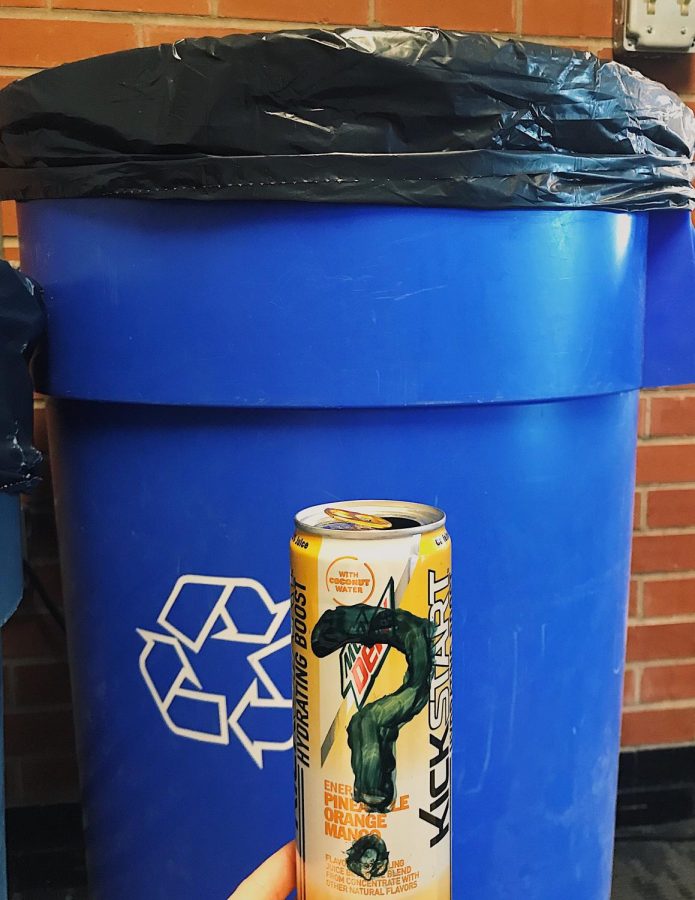The Recycled Truth
The fate of NAI’s recycling depends on the students themselves.
In a time period where global warming continues to occur rapidly, it almost appears to be a no-brainer that here at NAI, what gets put into the recycling bin is, in fact, recycled.
However, it has recently come to students’ attention that this is not the case. Regardless of whether a water bottle goes into the blue can or the gray, the end destination is still the same if the can is contaminated by students or faculty: the trash can.
Naturally, this served as a shock to students. Supritha Challa, Sophomore, found the news “surprising for sure. I had always just assumed that the school recycled regardless of what needs to be sorted out.”
Claire Shao, also a Sophomore, stated that she “think(s) it is strange that we have recycling bins around the school and it doesn’t actually get recycled.” Recently, new data has put even more of an emphasis on the state of Pittsburgh’s environment.
At first glance, one may think that ensuring the whole district is truly recycling can be easily and effectively done. In reality, however, the solution is much more clouded than it first appears. It turns out that the fate of NAI’s recycling depends on the students themselves.
When interviewed, Mr.Griffith, the Manager of Custodial Services for North Allegheny School District, confirmed that “they [recycling bins] are supposed to be taken into separate dumpsters. The only problem with that is that sometimes people throw things into it that will contaminate the whole thing. Then it will have to go into the trash.”
One of the most common contaminators, surprisingly, is plastic bags. “Every single building cannot put plastic bags in the recycling, so if there is one in there, the district gets fined. It doesn’t happen often, but it has before,” stated Griffith.
Thus, it appears that the only thing preventing the school from recycling is those who accidentally contaminate the bins with trash. However, through educating NAI on proper recycling and creating awareness, the issue can begin to be solved. “If each classroom was diligent, knowing where they are tossing what, because a lot of people throw the trash into recycling,” elaborated Mr.Griffith in regards to whether a solution is possible.
At the senior high, the procedure is the same. When interviewed by The Uproar, NASH principal Dr. Kreider, stated that “Businesses, corporations, and school organizations are held to different standards when it comes to recycling. If we get a product in [the recycling bins] that is not recyclable…the District will be fined $95.00 each time the materials they pick up are contaminated.”
Because the insurance of recycling is up to students, it is incredibly important for those at NA to be properly educated on what should be recycled, what should be placed in the trash, and just simply why recycling is so essential to the planet’s wellbeing.
A simple guide on what gets recycled, and what does not:
What can be recycled-
Plastic jars and bottles (excluding jello and pudding containers), cans made of aluminum, tin, or steel, glass, paper sheets, cardboard
In addition to keeping these items in mind, it is also important to remember to keep all items clean in order to prevent contamination.
What cannot be recycled-
Coffee cups, plastic bags, tissues, straws, post-it notes, most soft food wrappers (such as pop tarts), pudding and yogurt containers, plastic bags, ziplock baggies, styrofoam
Besides recycling of the bins in classrooms, the district has two recycling programs. One is through the schools recycling dumpsters from republic programs. The other is smaller buildings, like elementary schools, who have the older grades collect the recycling. Last year, the school managed to recycle 107 tons of paper! Mr. Griffith reported that “this year, we (the school) are shooting for 120 tons.”
While it is discouraging that students and faculty at NAI may be preventing recycled objects from actually being recycled by contaminating the bins, it is the students who can turn this around. By simply educating themselves on what goes where and the importance of doing so, it can be ensured that the school will be enabled to properly recycle.
The district is “looking into everything biodegradable…” says Mr. West, the general manager of school food services at NA.
One thing is for sure: aside from learning experiences inside the classroom, we should know that learning occurs all the time at school: in the cafeteria, and even when we throw away a plastic bottle. If we can be more aware of our disposal habits, it can be a good opportunity for us to learn, and take that learning out into the world.
Grade: Sophomore
Years on staff:2
Role: (staff writer) contributor
Life Soundtracks: New Person Same Old Mistakes; Tame...


